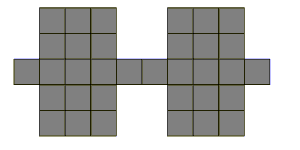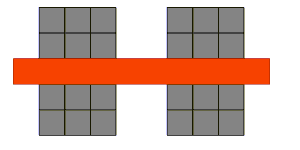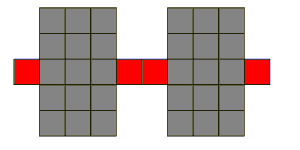Value
Meaning
LINE_SINGLE_REGION
For each line encountered by LBitmap::LineRemove, if the LBitmap::LineRemoveCallback callback member function returns SUCCESS_REMOVE, the removed line is added to an internal single region. If the callback member function returns SUCCESS_NOREMOVE, the line is not added to the single region. When LBitmap::LineRemove returns, either pBitmapRegion or hRgn will reference a region that contains all the removed lines. If LINE_LEAD_REGION is also set, pBitmapRegion will be updated with a shallow copy of pBitmap that has a LEAD region that contains all the removed lines. If LINE_LEAD_REGION is not set, hRgn is updated with a Windows region that contains all the removed lines. When the region (either LEAD or Windows) is no longer needed, it must be destroyed (either pBitmapRegion->pRgnInfo or hRgn).
LINE_LEAD_REGION
When LBitmap::LineRemove returns, pBitmapRegion is updated with a shallow copy of pBitmap that also contains a region with all the removed lines. This flag must be used in conjunction with LINE_SINGLE_REGION. To use this flag declare a variable of type BITMAPHANDLE and point pBitmapRegion to this variable. Then set uFlags to LINE_SINGLE_REGION | LINE_LEAD_REGION. This variable will be updated when LBitmap::LineRemove returns.
LINE_IMAGE_UNCHANGED
The original image is unchanged.
LINE_USE_DPI
The unit of measure for all fields of the LINEREMOVE structure is thousandths of an inch. Use the image's DPI to convert to pixels. This allows the processing of many images with different DPI. If this flag is not set, the unit of measure for all fields of the LINEREMOVE structure is pixels.
LINE_CALLBACK_REGION
LBitmap::LineRemoveCallback receives a Windows region that contains the current line to be removed. Setting this flag lets the user create his or her own composite of removed lines by combining the regions received by the callback member function, if the callback member function returns SUCCESS_REMOVE. The regions can be combined using a logical OR operator. Combining all regions received when the callback member function returns SUCCESS_REMOVE results in a region identical to the region created when LINE_SINGLE_REGION is set in uFlags. For an example, refer to LBitmap::LineRemove. When the region received by the callback member function is no longer needed, it must be destroyed using DeleteObject().
LINE_REMOVE_ENTIRE
Remove the entire line, even if the line passes through a character or a wall.
Consider the line below.

Setting iMaxWallPercent as 80 and passing LINE_REMOVE_ENTIRE will remove the red pixels as shown below.

LINE_USE_GAP
Consider "gaps" in lines when performing line removal. If this flag is passed, the iGapLength field of the LINEREMOVE structure is used. If this flag is not passed, the iGapLength field is ignored.
LINE_USE_VARIANCE
Consider line variance when performing line removal. If this flag is passed, the iLineVariance field of the structure is used. If this flag is not passed, the iLineVariance field of the structure is ignored.
LINE_ALLFLAGS
Use all behaviors of the line removal process.
